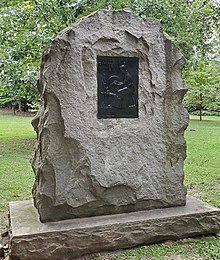
Woodruff Arts Center is a visual and performing arts center located in Atlanta, Georgia. The center houses three not-for-profit arts divisions on one campus. Opened in 1968, the Woodruff Arts Center is home to the Alliance Theatre, the Atlanta Symphony Orchestra, and the High Museum of Art.

Emory University Hospital Midtown is a 511-bed acute care teaching hospital located in the SoNo district of Atlanta, Georgia, United States, and affiliated with Emory Healthcare. The hospital's CEO is Dan Owens. Emory University Hospital Midtown is staffed by more than 1,000 private-practice and Emory Clinic physicians, spanning 28 specialties including cardiology, cardiothoracic surgery, oncology, neurosciences, general and vascular surgery, internal medicine, urology, obstetrics and gynecology. There is a level III neonatal ICU.
Fort Walker was a Civil War redoubt located on what is now the southeastern corner of Grant Park in Atlanta, Georgia.
Confederate monuments and memorials in the United States include public displays and symbols of the Confederate States of America (CSA), Confederate leaders, or Confederate soldiers of the American Civil War. Many monuments and memorials have been or will be removed under great controversy. Part of the commemoration of the American Civil War, these symbols include monuments and statues, flags, holidays and other observances, and the names of schools, roads, parks, bridges, buildings, counties, cities, lakes, dams, military bases, and other public structures. In a December 2018 special report, Smithsonian Magazine stated, "over the past ten years, taxpayers have directed at least $40 million to Confederate monuments—statues, homes, parks, museums, libraries, and cemeteries—and to Confederate heritage organizations."

Founded in the 1830s as a railroad terminus, Atlanta experienced rapid growth in its early years to become a major economic center of Georgia, with several hotels built to accommodate for this growth. Following its destruction during the Civil War, Atlanta experienced a resurgence and another hotel boom commenced in the late 1800s through the early 1900s. In the later half of the 20th century, hotel skyscrapers began to appear on the skyline, including what was at the time the tallest hotel in the United States. Later, a trend emerged of converting old office buildings into boutique hotels.

The American Memorial to Six Million Jews of Europe, also referred to as the Warsaw Ghetto Memorial, is a public Holocaust memorial situated at Warsaw Ghetto Memorial Plaza in Riverside Park, within the Upper West Side of Manhattan, New York City. It is a monument to the Warsaw Ghetto Uprising and the six million Jews who were murdered in the Holocaust. Dedicated on October 19, 1947, it is one of the first memorials to the Holocaust in the United States.
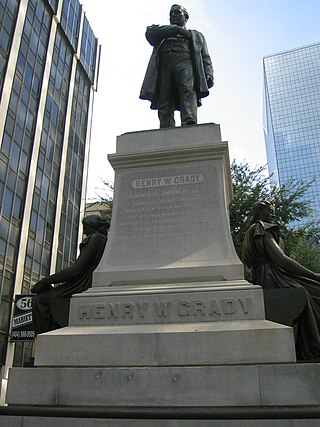
The Henry W. Grady statue is a monumental statue of Henry W. Grady in Atlanta, Georgia, United States. Built by Alexander Doyle in 1891, the statue lies at the intersection of Marietta Street and Forsyth Street in downtown Atlanta and was unveiled shortly after Grady's death in 1889. The statue has recently been the subject of controversy, as several groups have called for its removal due to Grady's support of white supremacy.

The Civil War Memorial in Savannah, Georgia, is a monument honoring soldiers who died during the American Civil War. Located in Forsyth Park, it consists of a 48 foot (15 m) tall shaft topped with a bronze statue of a Confederate soldier. Two bronze busts commemorating notable Confederate army officers flank the monument, which is protected by a railing, one of the only two that still stand around a monument, the other being the Casimir Pulaski Monument in Monterey Square. Originally known as the Confederate Monument, it was dedicated in 1875 to honor Confederate soldiers who died during the Civil War. Following the Unite the Right rally, the city of Savannah renamed and rededicated the structure in 2018. The monument is one of the oldest and largest Confederate monuments in Georgia.
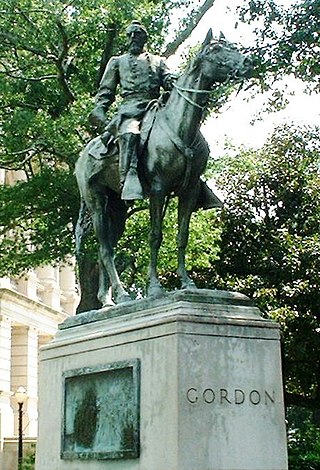
The equestrian statue of John Brown Gordon is a monument on the grounds of the Georgia State Capitol in Atlanta, Georgia, United States. The monument, an equestrian statue, honors John Brown Gordon, a general in the Confederate States Army during the American Civil War who later become a politician in post-Reconstruction era Georgia. Designed by Solon Borglum, the statue was dedicated in 1907 to large fanfare. The statue has recently become a figure of controversy over Gordon's racist views and associations with the Confederacy, with some calling for its removal.

The Eugene Talmadge statue is a public monument located on the grounds of the Georgia State Capitol in Atlanta, Georgia. Designed by Steffen Thomas, the statue was unveiled in 1949 and depicts Georgia Governor Eugene Talmadge. The statue has been the subject of recent controversy given Talmadge's white supremacist and racist views.

The Thomas W. Talbot Monument is a public monument dedicated to Thomas W. Talbot in Atlanta, Georgia, United States. Located in Grant Park, the monument was dedicated in 1948 to Talbot, who had founded what is now the International Association of Machinists and Aerospace Workers in the city in 1888.
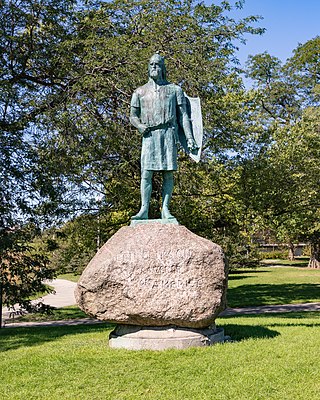
The Leif Erikson statue is a monumental statue honoring Leif Erikson in Chicago, Illinois, United States. Located in the city's Humboldt Park, the statue was designed by Sigvald Asbjørnsen and erected in 1901.

The Confederate Obelisk is a large Confederate monument located in the Oakland Cemetery of Atlanta, Georgia, United States. The structure, a tall obelisk located in the cemetery's Confederate section, was dedicated in 1874. Due to its connection to the Confederate States of America, the monument has been vandalized repeatedly.

Gateway of Dreams is a public monument in Atlanta, Georgia, United States. Located in Centennial Olympic Park, the monument honors Pierre de Coubertin, the father of the modern Olympic Games. The monument was dedicated in 1996.

The Sidney Lanier Monument is a public monument in Atlanta, Georgia, United States. Located in Piedmont Park, the monument consists of a bust of Sidney Lanier, a notable poet from Georgia. The monument was dedicated in 1914.

The Nathanael Greene Monument is a public monument in Savannah, Georgia, United States. Located in Johnson Square, the monument was designed by William Strickland and honors Nathanael Greene, a general in the Continental Army during the American Revolutionary War. While the cornerstone was laid in 1825, the monument was not completed until 1830, at which time it served as a joint monument for Greene and fellow Continental Army general Casimir Pulaski. The monument became solely dedicated to Greene in 1853, after which two bronze plaques honoring Greene were added to the structure. In 1902, Greene's body was reinterred under the monument. In 2018, one of the bronze plaques was vandalized with googly eyes, which drew national attention to the monument.

The Henry W. Maxwell Memorial is a public memorial located in Brooklyn's Grand Army Plaza in New York City. The memorial, designed by sculptor Augustus Saint-Gaudens, consists of a bronze tablet featuring a relief of Maxwell, a local philanthropist and park commissioner, affixed to a boulder. The memorial was dedicated in 1903 at the intersection of Eastern Parkway and Flatbush Avenue. In 1912, the memorial was moved to its present location at Grand Army Plaza. In the 1970s, due to vandalism, the plaque was removed and placed in storage, with a replacement plaque affixed to the boulder in 1996. The original plaque is located in the Brooklyn Museum.
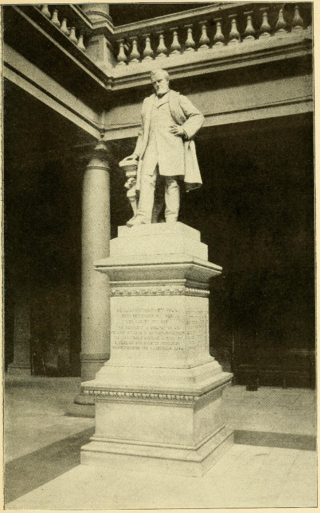
A statue of Benjamin Harvey Hill stands inside the Georgia State Capitol in Atlanta, Georgia, United States. The monumental statue was designed by American sculptor Alexander Doyle and originally dedicated in 1886 at what is now Hardy Ivy Park. The statue was relocated to the capitol building in 1890.
